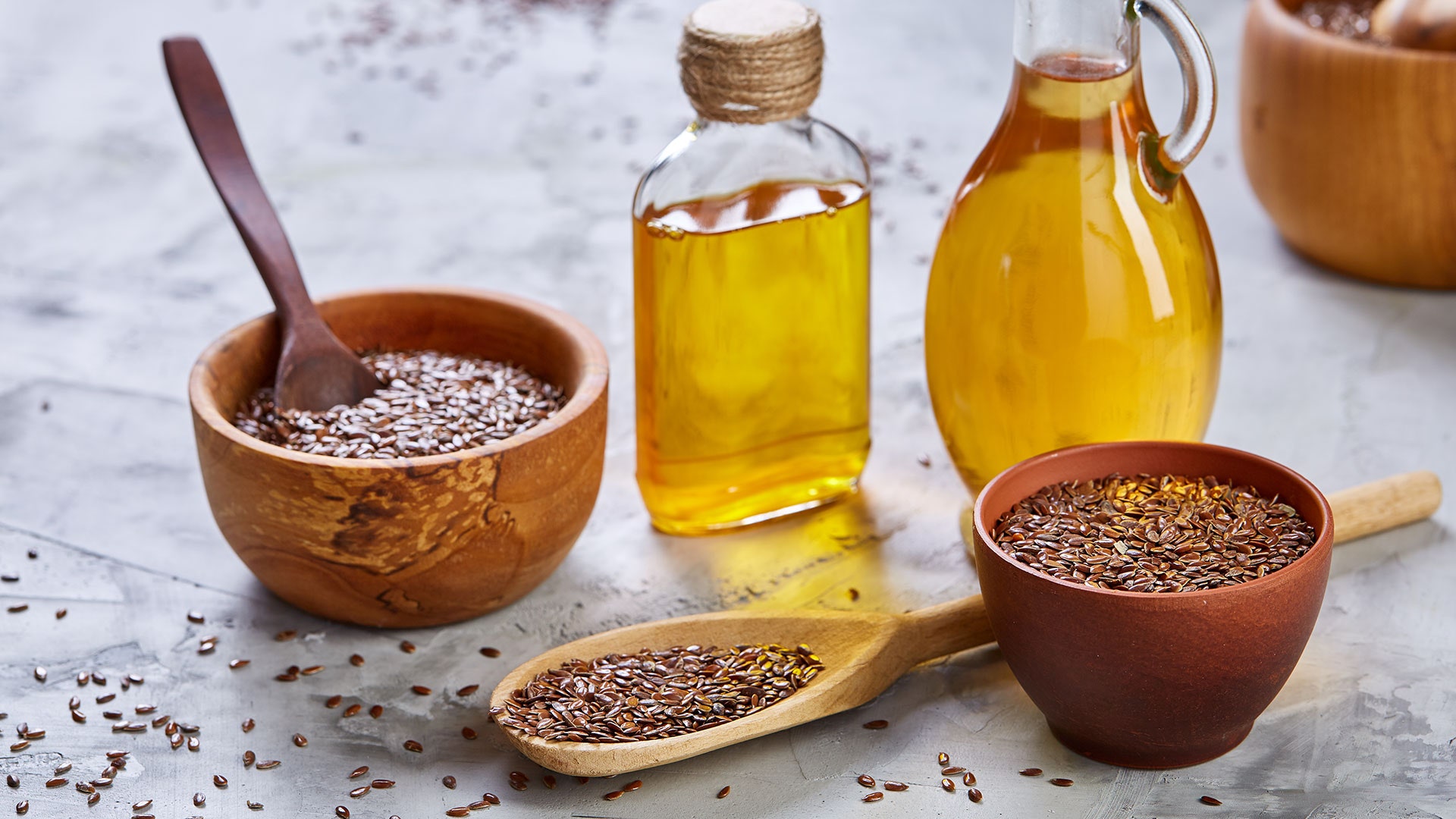Flax seed, also known as linseed, is noted to have high nutritional value, making it a priority choice of food for health conscious people. Flax seed has the natural properties of fiber, lignans and omega-3 fatty acids that provide preventative and restorative abilities to your diet. There are two types of flax seed. One type is grown for the seed use and considered an oil seed variety. The other is grown specifically for fiber production to be utilized in the texture industry.

Even though flax seed has been around since the dawn of civilization, it is more recently that mainstream society is beginning to understand its relevance to a healthy life. Nutritionists, physicians, and health conscious individuals are quickly becoming passionate about the health benefits of flax seed.
The health benefits of Flaxseed are as follows:
- Richest source of omega fatty acids and lignans (potent cancer fighters) known in nature. The immune-enhancing omega fatty acids 3, 6, and 9 are balanced in the combination your body requires for optimal health. Also loaded with vitamins and phytonutrients, and an excellent source of protein and fiber, flaxseed is nature’s gift to health!
- Provides improved Immune Function- Immunity is the body’s ability to defend itself successfully against foreign substances. The alpha linolenic acid, as well as the lignans, decreases inflammation and promotes healthy functioning of the immune system. Flax seed may be useful to manage autoimmune and inflammatory disorders such as rheumatoid arthritis, psoriasis, and lupus.
- Weight Management – research indicates that including flaxseed in your daily diet can help you manage your weight. Besides stabilizing your sugar levels, flax expands five times in bulk when ingested. Flax taken half an hour before meals will help you eat less, so you will lose weight while simultaneously strengthening your immune system.

- Affect on Hormone Levels – Flax seed, with its high concentration of lignans, is a great choice for all women, whether younger, middle-aged, or older, as a natural way to normalize the menstrual cycle, manage menopause, and lower the risk of osteoporosis, cancer and heart disease. Intake of flaxseed on a daily basis results in hormonal changes that are beneficial to women of all ages. In menstruating women who consumed 10 grams (about 2 teaspoons) of flax seed on a daily basis, significant hormonal changes have resulted. These changes are similar to those seen after consumption of soy isoflavones. Positive effects included fewer cycle changes, along with a reduction in ovarian disfunction. This, in turn, may decrease the development of breast and other cancers. As women reach menopause, the level of estrogens in their body decreases. This not only gives rise to menopausal symptoms, but also increases the risk of disease, including cardiovascular disease and osteoporosis. In post-menopausal women the protective effects of lignans is due primarily to their estrogenic activity. Lignans have even been proposed as an alternative to hormone-replacement therapy in post-menopausal women.
Adding just 1/8-1/4 cup of flaxseed to your daily diet can help reduce the risk of cancer, heart disease, high blood pressure, diabetes and assists with healthy weight management. |
- Protection against bone loss – Daily dietary intake of flaxseed offers protection against bone loss, may increase bone density, and reduces the risk of osteoporosis.
- Flax seeds have Anti-cancer Effects – Extensive studies on both breast and colon cancer indicate that flax seed may play an important role in cancer treatment, as well as prevention. A breast cancer prevention program done at the Princess Margaret Hospital and the Toronto Hospital, involving 50 women diagnosed with breast cancer revealed that- while waiting for surgery, half of the women received muffins containing 25 grams of milled flax seed daily while the other half received ordinary muffins. The women who received the flax seed muffins had slower-growing tumours compared to the other group.
- Flax seeds help Reduce the Risk of Cardiovascular Disease – It aids in decreasing the so-called “bad” cholesterol. Increase the “good” cholesterol, decrease blood pressure, suppresse the development of atherosclerosis and inflammation, and enhances blood vessel tone. Researchers at the University of Toronto found that total blood cholesterol levels dropped by 9% and LDL (“bad” cholesterol) decreased by 18% when a group of nine healthy women added flax seeds to their regular diets. The women ate 50 grams of milled flax seed a day for four weeks
- Seed for Fiber – The benefits of flaxseed in its whole seed form far surpass those of flax oil because freshly ground seed includes the fiber content that is so vital to maintaining digestive health. The insoluble fibre in flax seed is helpful in regulating bowel movements, increasing the frequency of bowel movements, and preventing or treating bowel irregularities and constipation. Soluble fibre is helpful in lowering blood cholesterol levels as well as lowering blood sugar levels (important for people suffering from diabetes).
- Flavor enhancer – The light, nutty taste of flax seed enhances the flavour of food, and adds nutritional value to your diet. Flax seed may be eaten on its own, sprinkled on cereal, popcorn, and salads, or added to oatmeal, yogurt, and blender drinks. Adding flax seed to baked goods adds flavour, extra texture, and good nutrition. Milled flax seed may be baked into a variety of products including breads, pancakes, bagels, muffins, and cookies.
- Look for a brand that has been certified organic – If you opt for oil or capsules, make sure the oil is expeller-pressed (also called “cold-pressed”). Expeller-pressed seeds produce the highest-quality flax oils. But most importantly, look for the lignans. Milled flax is by far your best source of lignans, but if you prefer oil or capsules, the bottle should state “with lignans” clearly on the label.
Above are the reasons why Flax seed is gaining popularity among health and nutrition experts as well as consumers. Start adding them to your diet, to derive better health.
Disclaimer
The Content is not intended to be a substitute for professional medical advice, diagnosis, or treatment. Always seek the advice of your physician or other qualified health provider with any questions you may have regarding a medical condition.



